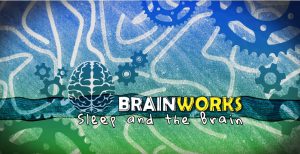CISSM Workshop 2021:
Interactive Technologies to Improve Sleep in Pediatric & Adult Populations
Sessions from the workshop are available by clicking on the links below:
- Self-Tracking in Health: Design Challenges and Opportunities
James Fogarty, PhD - Empowering Patients and Families Through Visualization of Patient-Generated Data
Suzanne Bakken, PhD, RN, FAAN, FACMI, FIAHSI - The Digital Phenotype: New Tools for Patients and Families
George Demiris, PhD, FACMI
Sleep in the News
Sleeping Tips When Staying Indoors During Isolation Period from the Sleep Research Society
This information is written for people who have to stay indoors for an extended period of time. If you are sleep deprived because of lack of opportunity to sleep (e.g., frontline health professionals, support workers, caregivers), please prioritize sleep and rest as much as you are able to. Click here to read!
![]()

Dr. Teresa Ward was part of a team that created an engaging video, BrainWorks: Sleep and the Brain, that explains why sleep is so important for teenagers. Production was made possible, in part, with the generous support of the Barbara Snider Endowed Fund for Sleep Innovation. Check out the video!
A Chatbot that Cares About Caregivers
Read about a chatbot that will use artificial intelligence (AI) to give caregivers more than a link to resources. It aims to detect how caregivers are feeling and suggest self-help options that respond to their needs. This project, Tailored Self-Management Program for Caregivers of Children with Chronic Conditions (CocoBot,) was one project funded through the Population Health Initiative.
Role of Sleep Disturbances as a Stroke Risk Factor
A topical review just published in Stroke about sleep disorders and stroke outcomes and recurrences discusses sleep disturbance as both a stroke risk factor and a link to poor stroke outcomes. The authors suggest sleep disturbance remedies could play an important role in primary and secondary stroke prevention.
Click here to see the full article.
Sleepmore in Seattle
Three Reasons to Consider Later School Start Times
Click on the link above to read the latest recommendations about school start times for children.
American Academy of Nursing Releases Position Statement on Nurse Fatigue
The American Academy of Nursing today released its position statement recommending policies and practices that promote adequate, high quality sleep for nurses to contribute to safe nursing practice and patient care. Click on the link above to read the full position statement.
Vital Signs: Trends and Disparities in Infant Safe Sleep Practices – United States, 2009-2015
Jennifer M. Bombard, MSPH; Katherine Kortsmit, PhD; Lee Warner, PhD; et al.
Improved implementation of the safe sleep practices recommended by the American Academy of Pediatrics could help reduce sleep-related infant mortality. CDC analyzed 2009–2015 Pregnancy Risk Assessment Monitoring System (PRAMS) data to describe infant sleep practices. Among all mothers responding, 21.6% reported placing their infant to sleep in a nonsupine position, 61.4% shared their bed with their infant, and 38.5% reported using soft bedding.
Click on link above to see the report.
Short Sleep Duration Among Middle School and High School Students — United States, 2015
CDC analyzed data from the 2015 national, state, and large urban school district Youth Risk Behavior Surveys (YRBSs) to determine the prevalence of short sleep duration (<9 hours for children aged 6–12 years and <8 hours for teens aged 13–18 years) on school nights among middle school and high school students in the United States. Click on the link above to read the article.
Night Shifts May Be Linked To Increased Cancer Risk In Women, Study Suggests.
TIME (1/8, Park) reports that research suggests “women who work the night shift have a 19% increased risk of developing cancer compared to women do not work at night.” The findings were published in Cancer Epidemiology, Biomarkers & Prevention. After analyzing data from 61 studies, researchers “found that women who worked night shifts for longer periods of time had a 41% higher risk of skin cancer, 32% higher risk of breast cancer and an 18% greater risk of digestive system cancers compared to women who did not work night shifts.” The data indicated that “the risk was highest among nurses who worked at night; their risk of developing breast cancer if they worked night shifts long term was 58% higher than nurses who didn’t have night shifts.”
HealthDay (1/8, Dallas) reports that the studies analyzed included “people from North America, Europe, Australia and Asia.” When the investigators “took into account for location, they found that only the night-shift workers from North America and Europe had a greater risk for breast cancer.” Medscape (1/8, Jenkins) also covers the story.
Letting teens sleep in would save the country roughly $9 billion a year
Read the article in the Washington Post by clicking on the link above.
Sleep Disorders Linked to Preterm Birth in Large California Study
Read the article from the University of California at San Francisco by clicking on the link above.
Why Is Sleep Important?
Click on the link above to read the latest from the National Heart, Lung, and Blood Institute on the vital role sleep plays in all aspects of health and well-being across the life span.
Insufficient Sleep May Be Linked To Larger Waist, Study Suggests
In “To Your Health,” the Washington Post (7/31, Cha, 12.92M) reports that researchers studying “the connection between sleep and weight gain” found that study participants “who were sleeping an average of six hours each night had waist measurements about 1.2 inches…more than those getting nine hours of sleep a night.” Participants “with less sleep also weighed more.” The findings were published in PLOS One. Forbes (7/31, 14.59M) contributor David DiSalvo also discusses the findings.
Upcoming and Past Events
No events at this time.
